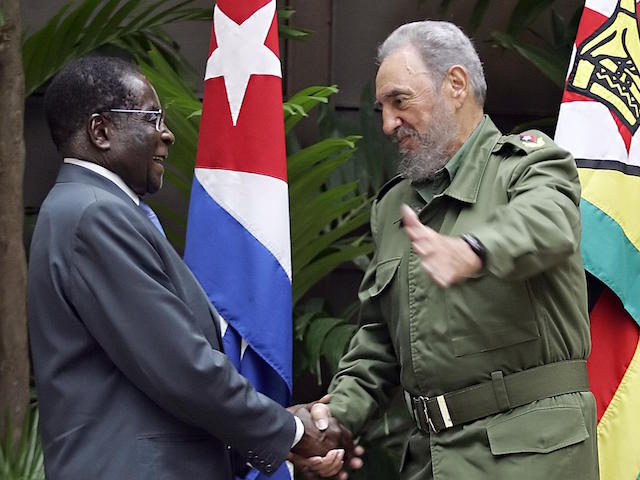The fall of Robert Mugabe, the genocidal first dictator of Zimbabwe, occurred almost exactly one year after his good friend Fidel Castro’s death. As Zimbabweans celebrate the nonagenarian’s demise, a look at the Cuba of today—the same Cuba as ever for nearly a century—should give them pause.
Like Cuba, Zimbabwe did not need to wait for Mugabe to die to celebrate a transfer of power to new president, Emmerson Mnangagwa. Fidel Castro “stepped down” and handed power to his brother, Raúl, years before the government officially announced his death. Yet Cuban exiles around the world celebrated Castro’s death—not his demotion—with the same fervor seen on the streets of Harare following a military intervention (don’t call it a coup, the military insists) that installed Mnangagwa as commander in chief.
Last year, Cubans believed that Castro’s final, physical removal from earth would trigger a new economic and political future for the island. Many thought that Cubans, most of whom had not lived under any other leader but Fidel, would somehow instinctively know to rebel and create true democratic institutions overnight.
Others of us, observing the whopping one person—artist Danilo Maldonado Machado, known as “El Sexto”—celebrating in the streets of Havana on November 25, 2016, knew better. But pessimist and optimist alike celebrated, and even this year observed the date.
As Cuban-American comedian Dairon Vázquez noted on Facebook, “Thanksgiving for gringos may mean reconciling with squanto or whatever but for us its this. Aunque cuba sigue en la misma mierda [Although Cuba is still the same shit] but whatever.”
Zimbabweans are displaying the same optimism Cubans did a year ago. Next year, it is difficult to see how they will escape Vázquez’s bittersweet observance, but today, they celebrate.
“It’s a new Zimbabwe. We are expecting a lot of changes economically. We are very happy with the brave army,” one man told South Africa’s News24 last week while cheering in Harare.
“It is all over. It has come to an end and it is an era that brought pain. He should have listened and gone earlier,” another told the outlet Quartz.
“We are free now,” a third told Canada’s Globe and Mail.
Zimbabwe has a lot to celebrate—a peaceful transfer of power, the continued existence of the nation and its diverse peoples despite Mugabe’s rule, an end to the very specific evil that is Mugabe. But nothing is “over” and Zimbabweans are not “free” any more than Cubans are a year after Fidel.
At 75, Zimbabwean President Emmerson Mnangagwa is little younger than Raúl Castro. Like the younger Castro, he served in part as his predecessor’s butcher. Just as Castro personally prepared anti-communists for their firing squad deaths, so too did Mnangagwa play a key role in “Operation Gukurahundi,” a genocidal campaign on Zimbabwe’s Ndebele ethnic group that killed at least 20,000 in the early 1980s.
Like Raúl and Fidel, Mnangagwa was Mugabe’s preferred successor. That only changed in early November, when Mugabe fired him to install wife Grace as his successor. That is to say, between Gukurahundi and this month, Mnangagwa was Mugabe’s right-hand man in running Zimbabwe. The economic collapse, the racist property nationalizations that triggered the economic collapse, the alliances with rogue states like North Korea, and the widespread persecution of any political dissident—Mnangagwa owns that.
Mnangagwa’s rise to power is a testament not to some radical change in direction for Harare, but to just how hated “Gucci Grace” is, by both the people and the military. There is no Grace Mugabe in Cuba, hence the lack of discord between the brothers.
Mnangagwa appears set to follow Raúl Castro’s lead as a loyal successor just as his support for Mugabe for the past three decades echoed the close bond of the Castro brothers. On Monday, the “new” Zimbabwean government announced an official Robert Gabriel Mugabe National Youth Day (February 21, his birthday) and a $10 million jackpot for Mugabe and his wife.
Mugabe reportedly demanded the money before stepping down, though some reports claim the protests against him also shocked him into accepting his removal.
The Mugabe cult of personality is already a pivotal part of the Mnangagwa regime—and it is a regime, because nobody elected him and he has full power to turn Zimbabwe’s government into whatever he wants.
“Let me at this stage pay special tribute to one of, and the only surviving father of our nation, Cde Robert Gabriel Mugabe,” Mnangagwa said early in his inauguration speech. “To me personally, he remains a father, mentor, comrade-in-arms and my leader.”
The Mugabes watched approvingly from their couch in an undisclosed location.
Meanwhile, in post-Fidel Cuba, little girls chant that the dead tyrant is “the boyfriend of all” and the nation continues in “mourning” while apparently denying that Castro died at all. Elián González, the nation’s highest-profile hostage, was there to commemorate that “Fidel never left.” While the communists are wrong that Fidel is, of course, still alive, they are correct in affirming that the evil that he birthed remains.
The same will be true of Zimbabwe under Mnangagwa. There is no escaping it. Only fresh leadership that is willing to tear down all governmental institutions left in the wake of a vicious cult leader and spend decades building sound institutions can free a nation. It takes decades of work and a complete overhaul of the names and faces in power.
That is, again, not to say that there is nothing to celebrate when a tyrant steps down. Eliminating the head of a rotten authoritarian regime provides relief to those forced to see that face and chant that name every day. Those who survive it can experience something new, even if not that new. Zimbabweans should get the same pass Cubans did for their outsized joy today, and their still-present but more tempered celebrations that will naturally occur a year from now if Mnangagwa remains in power.

COMMENTS
Please let us know if you're having issues with commenting.